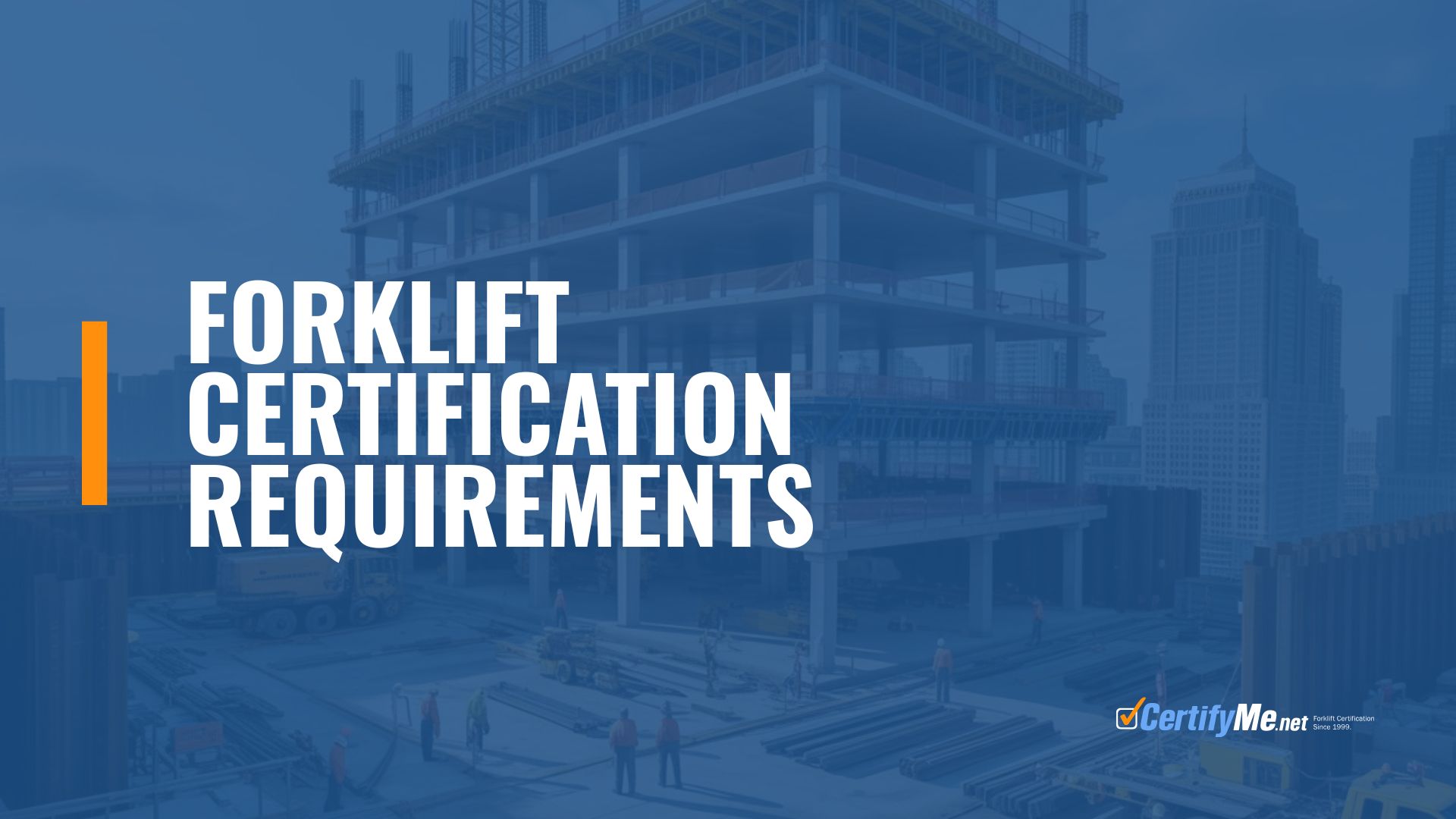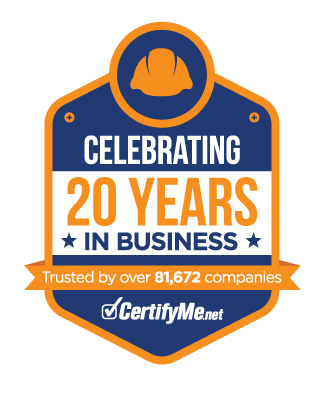OSHA Forklift Certification Requirements & Training Rules | 2025 Guide

OSHA forklift certification requirements ensure operators are trained and evaluated before handling powered industrial trucks. OSHA, the Occupational Safety and Health Administration, regulates workplace safety, including forklift operation, under 29 CFR 1910.178. Companies can help employees stay compliant by offering accessible Forklift Certification courses online through trusted providers like CertifyMe.
Failure to meet these requirements can lead to significant risks. OSHA estimates that 70% of forklift accidents are preventable. Without proper certification, companies expose themselves to costly fines, injuries, and potential fatalities. The possible risks of non-compliance are severe, and it’s crucial to understand that forklifts require precise operational skills. Proper certification reduces the likelihood of preventable incidents that could threaten both workers and company resources.
What Are OSHA Forklift Certification Requirements?
OSHA forklift certification requirements guarantee that operators are qualified to use powered industrial trucks safely. Employers must provide this certification training before permitting employees to operate equipment. Certification steps include:
- Operators must be at least 18 years old to begin the certification process and operate industrial vehicles.
- Completion of forklift training, both theoretical and practical, followed by passing certification exams.
- Refresher training is not just a requirement, but a vital component in maintaining safety awareness and compliance. It’s required every three years or after workplace incidents to ensure operators are always up to date with the latest safety practices. Operators must carry valid proof of their certification when performing tasks.
- Certification must specify the exact type or class of forklift the operator is authorized to use.
- Supervised operation is mandatory for trainees until they have achieved full certification.
- Site specific and Equipment specific training is required so that the operator is aware of potential hazards around the facility’s doorways, and can prove their proficiency in ramp safety at each of the different loading docks of the building.
Certification courses must cover both equipment operation fundamentals and workplace-specific hazards. Comprehensive training has a direct impact on accident prevention and regulatory compliance. Refer to OSHA Standard 1910.178 for detailed official guidance covering all powered industrial trucks.
OSHA Forklift Training Requirements: What You Need to Know
Operators need comprehensive, structured training to meet OSHA forklift training requirements effectively. The certification process is composed of these critical components:
- Interview Questions: In order to ensure that your operator is experienced operating a forklift, be sure to ask appropriate and specific questions to your interviewee prior to hiring them.
- Classroom instruction: Provides foundational knowledge about equipment operations, workplace hazards, load handling strategies, and emergency procedures. Instruction can occur in-person or through online platforms for added flexibility.
- Practical training: Involves supervised hands-on instruction where operators learn to maneuver forklifts safely within controlled environments, simulating real-world scenarios.
- Performance evaluation: Operators must undergo formal assessments to validate their operational skills and knowledge retention. Employers confirm qualification before authorizing independent operation.
Employers have several options when arranging training. Traditional in-person sessions provide direct interaction but can disrupt workflow and require more resources. Many companies prefer a hybrid approach that combines online theoretical coursework with in-house practical assessments, streamlining both scheduling and costs. CertifyMe.net’s online programs efficiently support these needs, allowing employees to complete courses at their own pace while ensuring OSHA compliance across operations.
OSHA Rules for Forklift Operator Certification
Certification rules outline multiple mandates that employers must fulfill:
- Forklift operators must meet the age requirement of 18 years or older prior to certification enrollment.
- Employers carry the responsibility to train, evaluate, and properly document each operator’s certification status throughout their employment.
- Refresher training becomes mandatory every three years or sooner if an accident or operational error occurs.
- Demonstrating operational competency under supervision is required before any operator can handle equipment independently.
Failure to comply with these rules can lead to substantial financial consequences. Under the Occupational Safety and Health Act of 1970, non-compliance penalties can exceed $70,000 per violation, depending on the severity of the offense. By adhering to certification rules, employers safeguard their workforce, reduce liability, and maintain regulatory alignment.
Is a License Required for Forklifts According to OSHA?
Although the phrase “forklift license OSHA” is commonly searched, OSHA enforces a certification requirement instead of a traditional licensing process. Operators must complete certified training, participate in practical assessments, and receive formal certification to comply with OSHA standards. It’s important to note that a regular state-issued driver’s license does not meet this requirement, as it does not provide the specific training and evaluation necessary for safe forklift operation.
Certification records serve as proof of qualification and must be maintained by the employer for verification during inspections or audits. These documents protect companies during compliance evaluations, demonstrating that every operator has received the necessary training and undergone the required evaluations to perform tasks safely and competently.
Get OSHA-Compliant Forklift Training Online
Online training options through CertifyMe.net fulfill OSHA forklift training requirements while offering unmatched convenience and accessibility. Trainees can access learning modules at any time, ensuring they absorb the required information at their own pace. After completing modules and assessments, participants receive their official certification, confirming their operational readiness.
Employers benefit from streamlined onboarding processes, reducing the time and costs associated with traditional classroom training. CertifyMe.net offers an efficient and affordable solution for businesses that need to certify entire teams without interrupting productivity. Whether companies seek initial certifications or refresher courses, CertifyMe’s platform delivers compliance-ready results that enhance workplace safety and regulatory adherence.
CertifyMe.net’s courses are OSHA-accepted nationwide, ensuring broad compliance and consistent safety standards across industries.
OSHA Forklift Certification Essentials: FAQ
Do I need an OSHA forklift license?
OSHA mandates operator certification instead of a traditional state-issued license. Once training and performance evaluations are completed, operators receive accreditation as proof of qualification to use powered industrial trucks safely.
What are the OSHA forklift certification rules?
Certification rules require operators to undergo structured classroom instruction, hands-on training, and formal performance evaluations. Refresher training must be completed every three years or sooner if significant operational errors or incidents occur within the workplace.
How long does an OSHA forklift certification last?
Forklift operator certifications remain valid for three years. If an operator is involved in a workplace accident or is found to be operating unsafely, employers must require retraining and reevaluation before allowing further use of equipment.
Does OSHA require hands-on training?
Yes. OSHA regulations stipulate that certification must include hands-on practical instruction, complementing classroom-based theoretical learning. Practical training ensures operators acquire real-world operational skills under direct supervision.
Is the OSHA certification test hard?
However, the exam is considered challenging as it covers a wide range of topics related to workplace safety and health, including hazard recognition, personal protective equipment, electrical safety, and other relevant areas. Studying diligently and actively participating in training sessions can help candidates pass the exam with confidence.
What are the consequences of not following OSHA forklift certification requirements?
Failing to comply with OSHA certification regulations can result in severe financial penalties, ranging from $5,000 to $70,000 for each violation. More importantly, uncertified forklift operators increase the risk of workplace accidents, injuries, fatalities, and costly property damage. OSHA enforces these regulations to protect both employees and employers from operational hazards. By following the forklift certification requirements, companies can avoid these penalties and ensure the safety of their workforce and workplace.
What are the benefits of following forklift certification requirements?
Following certification requirements ensures a safer working environment where operators understand how to minimize risks and handle equipment properly. Certified operators reduce liability exposure for employers, maintain compliance during audits, and help businesses avoid penalties and fines. Training fosters operational efficiency, enabling companies to maximize productivity while keeping employees safe and protected.
What does it mean to be an OSHA-certified forklift operator?
An OSHA-certified forklift operator has completed a recognized certification program, demonstrated their understanding of safe equipment operation, and received formal documentation verifying their qualification. This status confirms their ability to work safely and efficiently in environments where powered industrial trucks are used.
What happens if workers operate a forklift without certification?
Allowing untrained employees to operate forklifts exposes businesses to significant risks, including workplace accidents, equipment damage, and injuries or fatalities to employees. Additionally, OSHA can impose substantial fines on companies that fail to verify and document operator certification. Employing certified operators ensures compliance and reduces operational hazards.
Is it worthwhile to enroll the entire staff in forklift certification training?
Certifying all forklift operators within a company promotes workplace safety and ensures that each employee meets OSHA regulatory standards. Comprehensive training programs can prevent accidents, improve operational efficiency, and demonstrate a company’s commitment to employee well-being. By training every operator, businesses foster a culture of safety and compliance that supports long-term productivity.
CertifyMe.net: Your Forklift Certification Partner
Simplify the certification process with CertifyMe.net. Our online courses help you efficiently satisfy OSHA forklift certification requirements. From new operators to experienced workers needing refresher training, CertifyMe delivers accessible, OSHA-compliant solutions tailored to your workforce. Explore our training programs and help your team stay safe and productive today.

Follow step-by-step instructions to get OSHA compliant!
This low-cost program can be completed anytime, anywhere!




